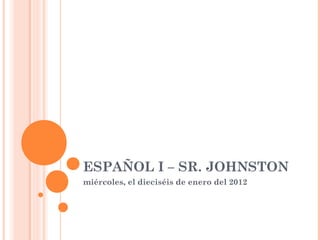More Related Content Similar to Leccion 1 17 13 (20) More from mjohnstonbga (20) 1. ESPAÑOL I – SR. JOHNSTON
miércoles, el dieciséis de enero del 2012
2. ACTIVIDADES DEL LIBRO
DESCUBRE
Abre el libro en las páginas 78-79 para estudiar
el árbol genealógico (family tree) de José Miguel.
En tu cuaderno, escribe (write) 1-10 y responde
CIERTO o FALSO a las preguntas.
Ahora, escucha la narración y escribe los
miembros de familia que apareczan (appear).
3. Adjectives are words that describe people,
places, and things. In Spanish, descriptive adjectives
are used with the verb ser to point out characteristics
such as nationality, size, color, shape, personality,
and appearance.
Copyright © 2008 Vista Higher Learning. All rights reserved. 3.1-3
4. Forms and agreement of adjectives
Copyright © 2008 Vista Higher Learning. All rights reserved. 3.1-4
5. Adjectives that end in -o have four different forms.
The feminine singular is formed by changing the -o
to -a. The plural is formed by adding -s to the
singular forms.
Copyright © 2008 Vista Higher Learning. All rights reserved. 3.1-5
6. Adjectives that end in -e or a consonant have the
same masculine and feminine forms.
Copyright © 2008 Vista Higher Learning. All rights reserved. 3.1-6
7. Adjectives that end in -or are variable in both
gender and number.
Copyright © 2008 Vista Higher Learning. All rights reserved. 3.1-7
8. *notas
Adjectives that refer to nouns of different
genders use the masculine plural form.
Copyright © 2008 Vista Higher Learning. All rights reserved. 3.1-8
9. *notas
Adjectives of nationality
Unlike in English, Spanish adjectives of
nationality are not capitalized. Proper names of
countries, however, are capitalized.
Copyright © 2008 Vista Higher Learning. All rights reserved. 3.1-9
10. Adjectives of nationality are formed like other
descriptive adjectives. Those that end in -o form
the feminine by changing the -o to -a.
The plural is formed by adding an -s to the
masculine or feminine form.
Copyright © 2008 Vista Higher Learning. All rights reserved. 3.1-10
11. Adjectives of nationality that end in -e have only
two forms, singular and plural.
Copyright © 2008 Vista Higher Learning. All rights reserved. 3.1-11
12. Adjectives of nationality that end in a consonant
form the feminine by adding -a.
Copyright © 2008 Vista Higher Learning. All rights reserved. 3.1-12
13. Adjectives of nationality which carry an accent
mark on the last syllable drop it in the feminine
and plural forms.
Copyright © 2008 Vista Higher Learning. All rights reserved. 3.1-13
14. Position of adjectives
Descriptive adjectives and adjectives of
nationality generally follow the nouns they
modify.
Copyright © 2008 Vista Higher Learning. All rights reserved. 3.1-14
15. Unlike descriptive adjectives, adjectives of
quantity are placed before the modified noun.
Copyright © 2008 Vista Higher Learning. All rights reserved. 3.1-15
16. Bueno/a and malo/a can be placed before or
after a noun. When placed before a masculine
singular noun, the forms are shortened: bueno
buen; malo mal.
Copyright © 2008 Vista Higher Learning. All rights reserved. 3.1-16
17. When grande appears before a singular noun, it
is shortened to gran, and the meaning of the
word changes: gran = great and grande = big,
large.
Copyright © 2008 Vista Higher Learning. All rights reserved. 3.1-17
18. Provide the appropriate forms of the adjectives. The
first item in each group has been done for you.
simpático alemán
1. simpático
Mi hermano es ________. 1. alemán
Hans es ________.
2. La profesora Martínez es _____. 2. Mis primas son _____.
3. Rosa y Teresa son _____. 3. Marcus y yo somos _____.
4. Nosotros somos _____. 4. Mi tía es _____.
Provide the appropriate forms of the adjectives. The
first item in each group has been done for you. (cont’d)
difícil guapo
1. La química es _______. 1. Su esposo es _______.
2. El curso es _____. 2. Mis sobrinas son _____.
3. Las pruebas son _____. 3. Los padres de ella son _____.
Copyright © 2008libros son _____. rights reserved.
4. Los Vista Higher Learning. All 4. Marta es _____. 3.1-18
